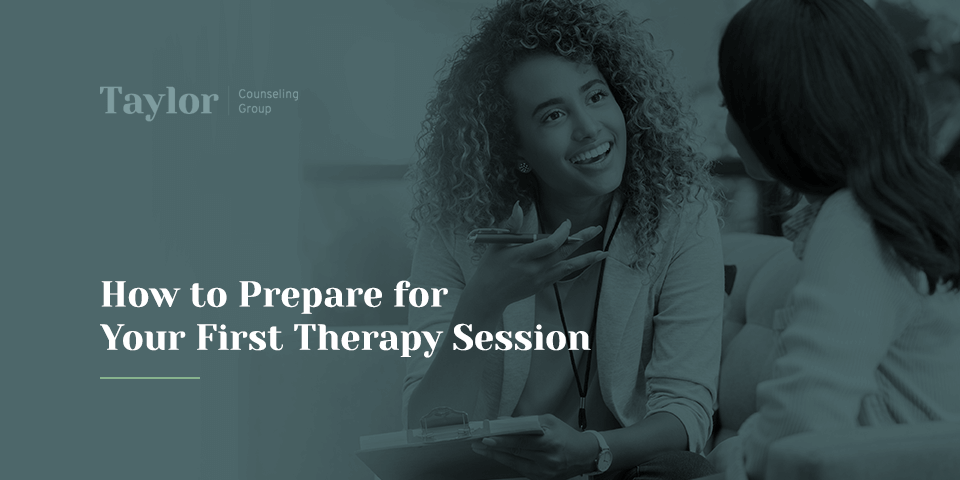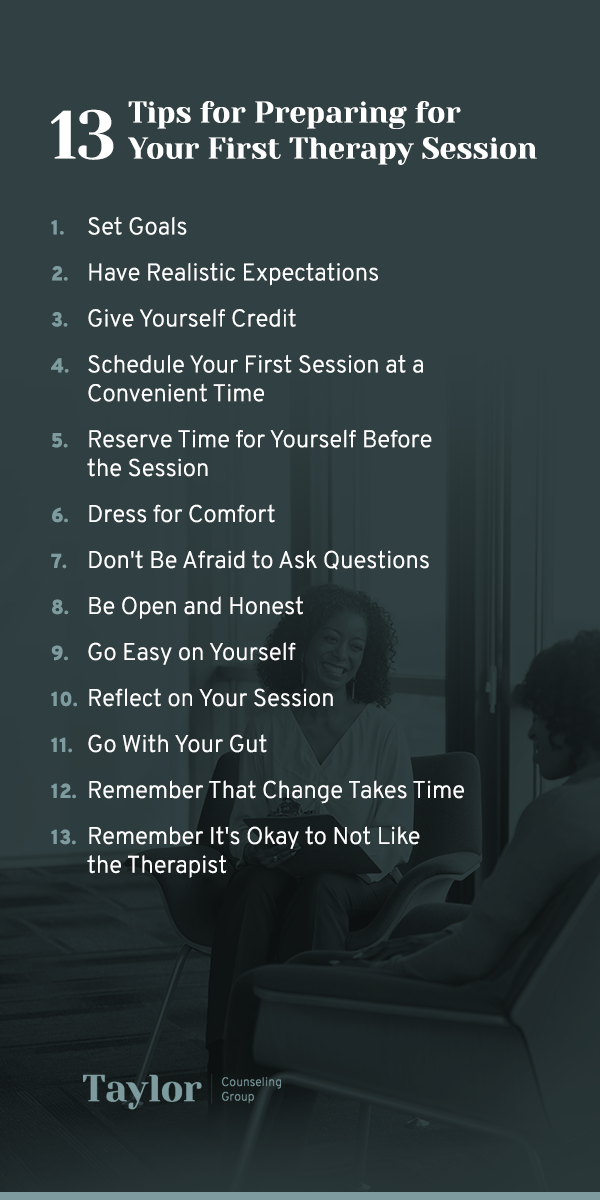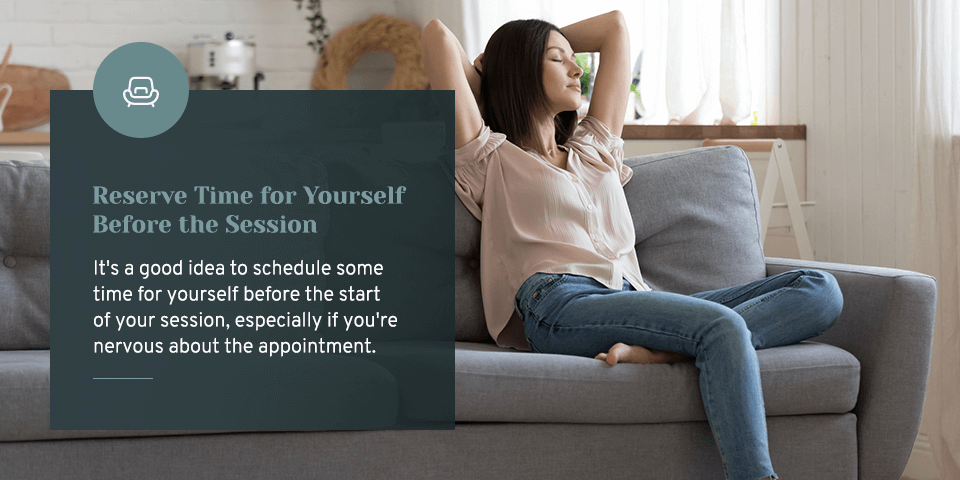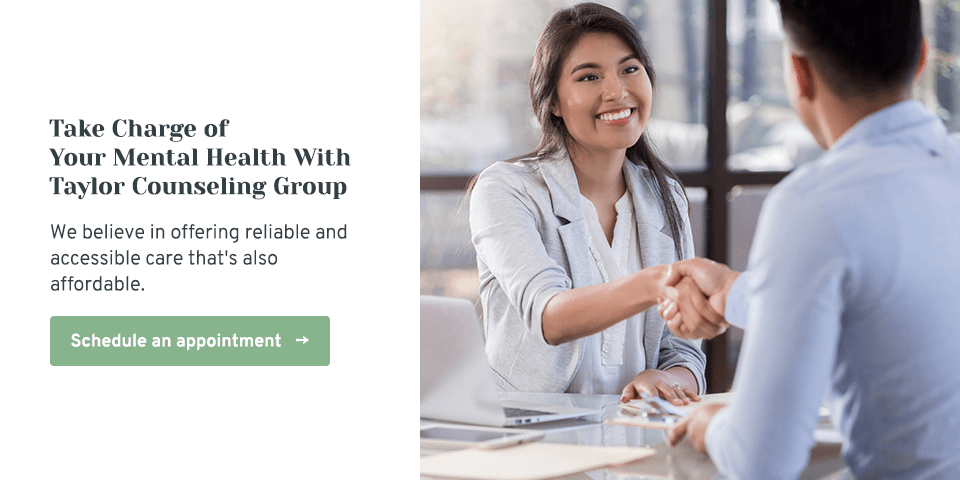As worthwhile and rewarding as therapy is, the first session can be nerve-wracking — especially if you’ve never been to therapy before. Preparing for a counseling session is a useful habit to get into, even if you’re a seasoned pro. In this guide, we’ll discuss several first counseling session tips so you can feel as prepared as possible.
13 Tips for Preparing for Your First Therapy Session
Once you’ve found a therapist to meet with, part of the work is already done — you’ve started your journey to self-improvement.
The whole process can be frightening, so it’s a good idea to remember why you decided to take these steps in the first place. The goal is to improve your overall mental health, which can affect many aspects of your life, including your physical health. Mental health is often overlooked, even though almost 47 million people live with some type of mental illness in the United States alone. Therapy is one of the first steps towards addressing and healing from a mental illness, but the decision to reach out for help can be a difficult one.
Once you reach out and arrange your first therapy session, you’re likely to feel nervous or scared, especially if you’re new to therapy. As your first appointment nears, here are some ways to mentally and physically prepare yourself:
1. Set Goals
Before your first session, you should outline clear therapy goals for what you hope to achieve from counseling. Everyone’s reasons are personal, and there are no right or wrong reasons to seek therapy. Try to understand what brought you to therapy and how you hope to leave.
If you’ve been to therapy before, consider what you liked about previous therapists and what worked best for you in therapy. Also, consider what did not work and what, if anything, you did not like about your previous therapist.
Therapy is most productive when it’s introspective, so it’s a good idea to pinpoint what is weighing on you the most and what you’re hoping to achieve from therapy. For example, if you’ve been feeling unmotivated and unhappy lately, spend some time considering why you’re feeling that way.
However, if you’re not sure why you opted for therapy or what you hope to achieve from it, don’t be stressed. While it’s good to have an idea of what you’re hoping to achieve, it’s normal to be unsure or need some help sorting it out. That’s part of what therapy offers.
2. Have Realistic Expectations
Therapy is great and can be extremely beneficial, but it’s not a magic cure-all. If you walk into your first counseling session and expect to leave completely cured, you’ll be disappointed. Make sure your goals are manageable and that you understand that therapy is a process that requires a lot of work.
It may take a few weeks or even a few years to reach your goal, and the first therapist you meet with may not be the one with whom you finish your journey.
Therapists are only human, so expecting them to have all the answers to your questions is a good way to set yourself up for disappointment. Therapy will require work from you as well as your therapist — and it won’t be as simple and condensed as the therapy sessions you see in TV shows or movies.
3. Give Yourself Credit
It’s not easy to seek help for your mental health. For a long time, the stigma of mental illness prevented people from seeking help, but today, we know a lot more about how mental health affects other aspects of our lives. Still, many people are unable to take the step to see a professional, so if you’ve come this far, it’s definitely worth celebrating.
Mental health is just as important as physical health, so seeing a therapist to maintain good mental health shouldn’t be much different than exercising to maintain good physical health.
4. Schedule Your First Session at a Convenient Time
If you’ve never been to therapy before, you don’t know how you’ll feel after a session. Some people feel fine enough after therapy to go back to work or school, while others need several hours to sit with the feelings and truths that therapy may reveal.
To be safe, schedule your first appointment on a day off or at a time when you have little else to worry about. Try to avoid making any definite plans for after therapy as well, just in case you find yourself feeling overwhelmed or wanting to be alone. You may feel enthralled and refreshed after your session and have a motivation you didn’t have before, or you could find yourself deep in your own thoughts and unwilling to socialize. Consider each of these scenarios when scheduling your first session.
Eventually, you’ll become aware of how you feel after therapy and be able to schedule sessions accordingly.
Book Online Our Locations Our Therapists
5. Reserve Time for Yourself Before the Session
It’s a good idea to schedule some time for yourself before the start of your session, especially if you’re nervous about the appointment. Turn off your cellphone and put away your work to allow yourself to just sit with your feelings.
Preparing to open up emotionally can cause stress, making your heart beat faster. This forces your body to release a hormone called cortisol, which can lead to a flight-or-flight response. It’s perfectly natural, but it can be counterproductive, so invest time in focusing on yourself, breathing and staying hydrated.
This also allows you plenty of time to find your therapist’s office. If you’re already nervous about the appointment, you don’t need the added stress of running late.
6. Dress for Comfort
Therapy isn’t a job interview or a black-tie event, so there’s no pressure to dress up — unless that’s what makes you comfortable. Dressing in comfortable clothes — whatever those may be for you — will help you feel more relaxed overall.
Just be yourself and wear what’s comfortable for you — whether it’s sweatpants or a cocktail dress, physical comfort is complementary to emotional comfort, allowing you to be more relaxed and vulnerable during the session.
7. Don’t Be Afraid to Ask Questions
During your session, you can talk as much or as little as you’d like — it’s all about your comfort. But it’s good to understand that there are no wrong questions in therapy, and even if the therapist doesn’t have all the answers, they can help guide you to the answers.
There’s no shame in asking questions about billing, scheduling or insurance. Make a list of these questions ahead of time and get them over with at the start of your session or request time near the end to go over them with your therapist.
Throughout the session, feel free to ask questions about your therapist’s professional experience, their strategies and anything else you’re curious about.
8. Be Open and Honest
As daunting as it may be, being open and honest about your thoughts and feelings is crucial if you want to get the most out of therapy. That doesn’t mean you need to offload all your innermost feelings in the first session, but allow yourself to be a little freer while talking. Therapy isn’t a fun pastime, and it does require some discomfort to achieve your goals.
To meet the goals you set for yourself, you’ll need to be completely honest, even if it’s embarrassing and uncomfortable. Just remember that the therapist isn’t there to judge you, but rather to help you, and everything you say is completely confidential.
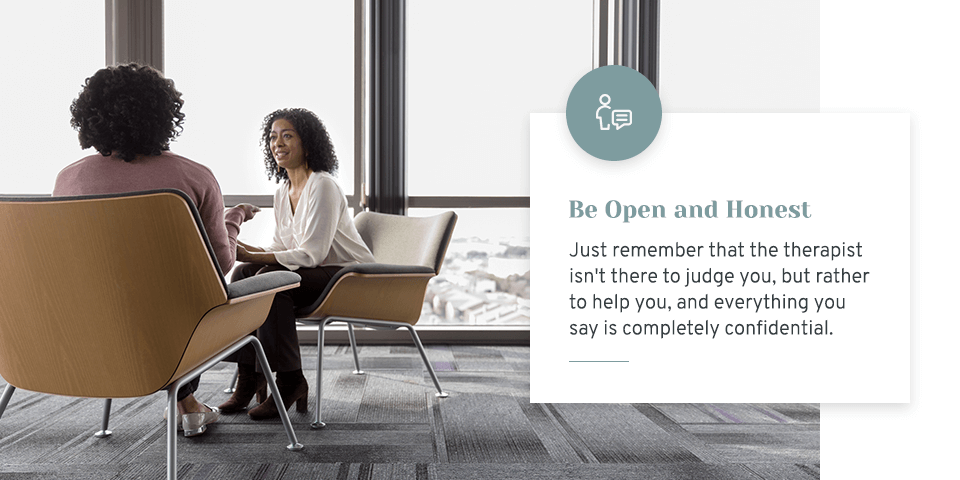
9. Go Easy on Yourself
It’s perfectly normal to be nervous or anxious before your first therapy session. Try not to fret about what to say or how to act and just congratulate yourself for taking the step to improve your mental health. You’re allowed to feel scared, overwhelmed or even excited.
Beating yourself up for feeling scared or anxious can be counterproductive to your long-term goals, so remember that nerves are normal — you may even want to start your therapy session by talking about how scared or nervous you are and allowing the therapist to help you become centered again.
10. Reflect on Your Session
As you become more familiar with yourself during and after therapy, you’ll figure out what works best for you. After the first session, however, it’s a good idea to take some time to process the session. Don’t turn your phone back on straight away. Instead, take a short walk or grab a coffee and sit in a cafe to ponder. Reflection doesn’t need to be done straight away, either. You can reserve some time later that day, that evening or in the following few days.
Consider everything that was said in the session and how it made you feel. Consider how you feel now that the session is over and what you thought of the therapist. Some people like to journal after a therapy session, but anything that helps you analyze and understand your emotions is best. Try drawing, journaling, walking or exercising — whatever it is, allow yourself to do some post-therapy reflection.
The goal is to really think about your session — what was discussed, how it’ll assist you in achieving the goals you’ve set for yourself — and what you’re hoping to begin working on. It may also lead to new goals coming into the light that you hadn’t previously considered.
11. Go With Your Gut
When reflecting on your therapy session, don’t ignore your gut feelings. If something felt off or not quite right, examine it instead of ignoring it. Consider things like how the therapist made you feel or whether the session was too uncomfortable.
Tune in to these gut feelings because they may tell you more about how you felt about therapy, and to get the most out of your sessions, you need to feel safe and comfortable. Although therapy can be uncomfortable sometimes, it’s not meant to make you feel worse about yourself.
At the same time, it’s important to be reasonable and not jump to conclusions. The first session is just that — the first session. It usually takes a few sessions before you can make an accurate decision about the type of therapy, the therapist and whether it’s working for you.
12. Remember That Change Takes Time
Don’t worry if you feel like you haven’t made any big strides during your first session. Therapy is an ongoing process, and one session will not solve all your problems. The same way you won’t earn a six-pack of abs after one day of sit-ups, your problems won’t be solved after one session of therapy.
You should also keep in mind that the length of therapy varies from person to person, and it can take years for some people to see results. The important thing is to stick to it and keep working with your therapist to reach your goals. But it’s equally important to celebrate the small steps that all lead to the final destination. So, even though you may not feel you’ve made great strides in your first session, know that you are one step closer to your goal.
13. Remember It’s Okay to Not Like the Therapist
It’s best to go through a few sessions with a therapist before deciding if you’re going to continue seeing them — but if it’s not working out, there’s nothing wrong with that.
Therapy is a deeply personal experience, and you deserve someone with whom you can be comfortable and get along. It’s a two-way street, so both you and your therapist have to be compatible for therapy to be successful. It’s important to choose the right therapist for you, and if you know that things won’t work with this therapist, there’s nothing wrong with telling them you’d like to change therapists.
Alternatively, you could end up feeling like you dislike the therapist because they made you acknowledge things about yourself that will lead you to do more work to achieve your goals. It’s similar to how you may dislike your personal trainer for making you work hard, but you both know it’s for the greater good. Both you and your therapist have the same goals: your well-being. Your therapist may voice ideas that you may not like to hear, but just remember that the therapist is only here to help you, not hurt you.
If you’re concerned about offending the therapist, don’t be. They are professionals, and they will understand that you are doing what’s best for you and your health, and they will support your decision.
Book Your First Therapy Session Today
Ready to get started? Contact the professionals at Taylor Counseling Group for complete clinical support with regaining control of your mental and emotional well-being. Schedule an appointment online any time of day or night using our client portal, or reach out to us by calling (214) 530-0021 to get started with our counseling services.


